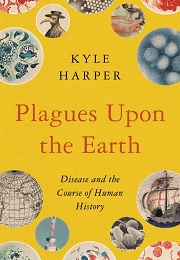Plagues upon the Earth: Disease and the Curse of Human History

Kyle Harper
Princeton University Press, £28.00
Presented as a germ’s-eye view of history from human origins to global pandemics, this wonderful book is prefaced by a short quote from John Donne (1611) “This new world may be safer … There is no health; physicians say that we at best enjoy but a neutrality. And there can be worse sickness than to know that we are never well, nor can be so?”
In a time of our newest plague (COVID-19) this wonderful, well-timed book opens with a reminder that one of the chief blessings of modern life is supposed to be that the risk of dying from an infectious disease has become vanishingly small. Germs have been brought to heel. We moderns die of old age, overabundance, cellular malfunction, but not of plagues or poxes.
The book opens with an overview of microbial ecology and our growing understanding and eventual fight against virulent pathogens. The author then progresses sequentially through the appearance of malaria in the early 20th century, and the Tsetse fly in sub-Saharan Africa. Harper carefully, and accurately, links the value of sanitation and hygiene in prevention and spread of infectious diseases.
The book moves through the 19th and 20th centuries via chemical control of pathogens and their vectors, the development and use of disinfectants and later antibiotics. Eventually the reader is taken to a time in the history of our species when cancer, cardiovascular disorders, and other chronic and degenerative diseases account for a greater proportion of total mortality than infectious diseases.
It would be foolhardy to think that the war against infectious disease is over. Far from it. No sooner than we were enjoying the benefit of antibiotics than acquired antibiotic resistance was observed. Add MERS, SARS, ZIKA, Ebola and COVID-19 and some may believe that we are at increasing risk of losing ground to our many microbial foes.
The author started to write this book in 2017, finishing in the midst of a global pandemic. For this he deserves praise for a very readable, informative, and challenging book that will surely be enjoyed by biologists, physicians and many others. It makes us think of our past, and to some extent to fear for our futures. But it also gives hope, by taking us away from our too often myopic research specialties to see, in stark detail, the wider background of lives lost, lessons learned and the many challenges ahead.
Ian Blenkharn FRSB


